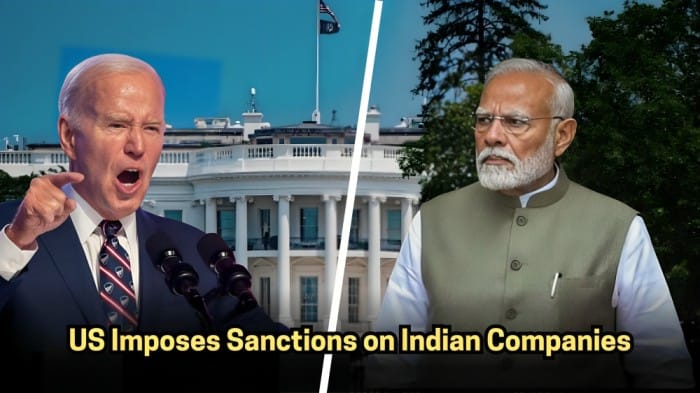The United States has imposed sanctions on 275 individuals and entities across the world, accused of supporting Russia’s military industry. Sanctions have been imposed on 15 Indian companies along with those in China, Switzerland, Thailand, and Turkey. The US Treasury Department announced the sanctions to prevent Russia from accessing advanced technology and equipment, which is considered essential for its current military operations.

The Treasury further stated that such sanctions are targeting the destruction of global networks that might be helping Russia circumvent the existing sanctions. Those companies within the network have been accused of providing materials and technologies that are critical for Russia’s activities. In simple words, the U.S. along with its allies is committed to cutting all resources that may fuel what it calls Russia’s “illegal and immoral war against Ukraine.”
Deputy Secretary of the Treasury Wally Adeyemo said: “We will continue to take strong action around the world to prevent the flow of critical tools and technologies that Russia needs to continue its war.”
The U.S. will further strengthen the reduction in Russia’s capability to be able to sustain its military operations.
Sanctioned Indian Companies
Among these, are Abhar Technologies and Services, Denvas Services, Galaxy Bearings, and Lokesh Machines Limited, among others. This list covers different sectors, such as manufacturing and technology services, and highlights the various ways companies might be supporting Russia’s defense sector. The U.S. did not clarify what role each of these companies played, but their participation does raise questions about India’s role in the conflict and the intricacy of global trade networks.
What is interesting is that the sanctions do not target Indian entities alone. Sanctions have also been placed on firms based in China that are exporting dual-use goods; such goods are products or items that can be utilized for both military and civilian use. The U.S. argues that such goods are indispensable to fill important gaps within Russia’s defense capabilities. This is an important factor because it draws attention to the U.S.’s concerns about the indirect continuation of Russia’s defense capacities through China’s role. Even countries like Belarus, which continue to support Russia under their Lukashenko regime are also under the spotlight for companies and individuals.
The approach of the US to Sanctions on a Global Level is Broad-Based
One thing that very strongly comes out here is that U.S. sanctions are deep-reaching. Almost 400 entities and individuals in this latest ratcheting up represent a strategy not just on direct suppliers to Russia but also through third-party intermediary networks in various third countries. Indeed, Secretary of State Antony Blinken highlighted precisely that fact in announcing today, laying stress on the critical contributions of entities and officials from third countries that enable Russia’s war efforts.
But on the other hand, would such sanctions be effective? Would this stop Russia’s military from continuing operations or just drive the supply chains deeper underground? To me, sanctions can indeed be a strong political message and could shake businesses up, but in the end, they probably would not fully cut off these supplies from reaching Russia. Global trade networks have been large and complex. Companies may find ways to circumvent these restrictions, especially large economies like China may even have strategic interests in opening up some channels.
Implications on Indian Businesses and Relations with the US
This sanctions announcement can also have implications for India’s relationship with the U.S. India balances its historical ties with Russia and its growing economic relationship with the U.S. As a neutral party to the Russia-Ukraine conflict, India has tried to maintain its economic and political independence, though these sanctions could test that balance.
Sanctions bring potential business restrictions and also difficulties in accessing the worldwide market for the concerned companies, creating a possible blow to their business reputation. If such corporations play a vital role within the Indian economy or can be associated with other businesses that are critical to such an economy, sanctions are likely to create a ripple, affecting the related sector concerned. In my opinion, this could press the concerned Indian authorities to check carefully on business dealings so they do not face such circumstances again, which would likely damage India’s economic relationships.
It’s more than a blow to supply lines in Russia. That message is more understandable and sent out to the world when it comes to the question of supporting or indirectly being an assistant to the Russian military effort, they will also be on the watch list. The US and her allies seem pretty stern concerning bringing these players of the world into their accountability book, no matter where the country stands regarding this issue.
In short, this new wave of sanctions mirrors the aggressive approach that the U.S. has adopted against the support system that Russia uses. But will this act lead to a long-term blow to the Russian military or will it merely prompt companies to go into hidden and complicated routes of trade? Only time will be able to answer whether this holds Russia’s military capabilities in check and affects India-U.S. ties in the near future.
Minutes by M31GlobalNews






